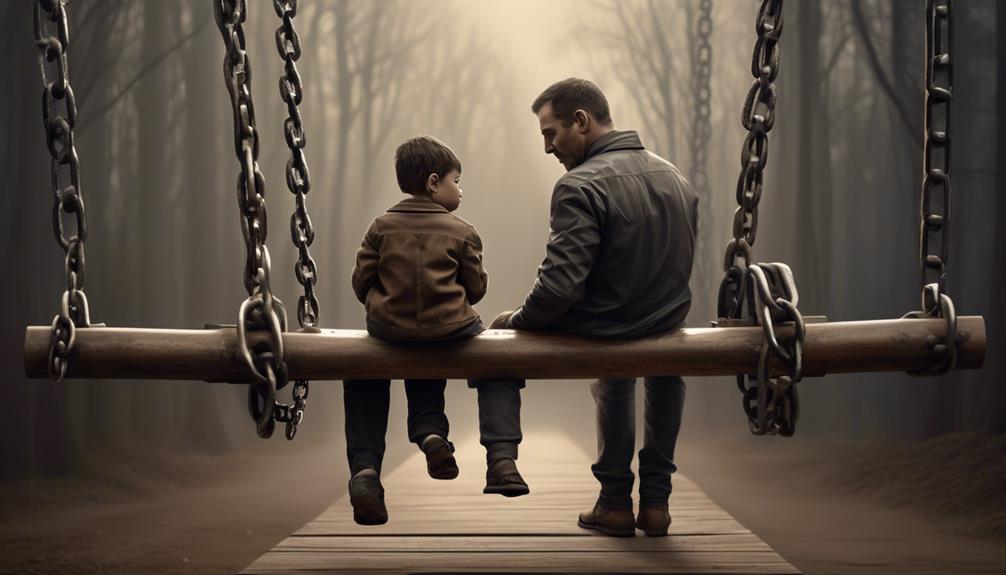Navigating our relationship with our father can often feel like treading on a tightrope because of his Borderline Personality Disorder (BPD), which brings about sudden changes in mood and impulsive actions. The persistent worry of triggering his unpredictable reactions often leaves us emotionally exhausted and unsure of our own feelings.
However, understanding how BPD influences his actions and seeking support can provide a roadmap for fostering healthier interactions and building resilience within ourselves.
The complexities of having a father with BPD require us to explore the intricacies of this condition and its impact on familial dynamics, offering insights into the journey of healing and growth within the family unit.
Key Takeaways
- Male BPD individuals exhibit aggressive behavior.
- BPD in fathers leads to intense emotional responses.
- Support and interventions can improve family dynamics.
- Children of fathers with BPD benefit from clear boundaries and self-care.
Understanding Borderline Personality Disorder in Fathers
When fathers experience Borderline Personality Disorder (BPD), their parenting behaviors may manifest in abrupt displays of anger and rage, impacting family dynamics significantly. These emotional reactions can lead to controlling parenting styles, creating a tense atmosphere within the household.
Fathers with BPD often exhibit aggressive behavior, which may be more prevalent and socially accepted in males compared to females with the disorder. The resulting tumultuous relationships can be challenging for both the father and the family members involved.
Recognizing signs such as intense emotional responses, struggles with substance abuse, and turbulent relationships is crucial in identifying if a father is dealing with BPD. Understanding the unique challenges faced by male BPD individuals can help in providing appropriate support and interventions to improve family dynamics and the overall well-being of everyone involved.
Effects of BPD on Father-Child Relationships

Fathers with Borderline Personality Disorder may struggle to establish healthy and nurturing relationships with their children, often exhibiting controlling or strict parenting behaviors influenced by their emotional dysregulation. This can have profound effects on father-child relationships, leading to emotional manipulation, judgmental attitudes, and tumultuous dynamics within the family unit. As a result, children of fathers with BPD may experience inconsistencies in their interactions, heightened emotional reactions, and even instances of rage. Substance abuse problems can also arise in these households, further complicating the already challenging environment for the children.
Understanding these complexities is crucial in addressing the difficulties faced by families affected by BPD.
- Emotional dysregulation impacts parenting behaviors
- Controlling behavior affects children's sense of autonomy
- Judgmental attitudes can lead to self-esteem issues in children
- Tumultuous relationships create instability and fear
- Substance abuse worsens the family environment
Coping Strategies for Children of Fathers With BPD
Navigating the complexities of growing up with a father who's Borderline Personality Disorder can be challenging, but implementing effective coping strategies is essential for maintaining emotional well-being and stability.
Children of fathers with BPD often face inconsistent emotional responses and unpredictable behavior, which can lead to heightened emotional responses. To cope with these challenges, it's crucial for children to learn how to set clear boundaries to protect their emotional well-being and promote stability within the family dynamic.
Recognizing and validating one's own emotions is also key in dealing with a father with BPD. Seeking therapy and support groups can provide children with the necessary tools to navigate these difficult emotional landscapes.
Additionally, developing healthy communication skills and engaging in self-care practices are essential for maintaining mental health while dealing with the unpredictable behavior that often comes with BPD. By incorporating these coping strategies, children can better manage the emotional toll of having a father with Borderline Personality Disorder.
Seeking Support for a Father With BPD

Understanding the emotional challenges faced by a father with Borderline Personality Disorder is crucial in seeking support for his well-being. When supporting a father with BPD, it's essential to consider his emotional volatility and intense reactions. Here are some key steps to help navigate this delicate situation:
- Encourage therapy and treatment options to effectively manage BPD symptoms.
- Educate family members on BPD to create a supportive environment for the father's recovery.
- Establish clear boundaries and communication guidelines to facilitate interactions with a father who's BPD.
- Seek professional help from therapists or support groups to access additional resources and guidance for both the father and family members.
- Provide unwavering family support, showing understanding and patience as the father navigates his BPD journey.
Navigating Life With a Father With BPD
In supporting a father with Borderline Personality Disorder, it is crucial to adapt to the unique challenges his condition presents within the family dynamic. Fathers with BPD may exhibit controlling behaviors, sudden bursts of anger, and emotional manipulation, leading to a tumultuous household environment. Substance abuse problems might further complicate matters, affecting the family's stability and emotional well-being. Navigating life with a father who has BPD requires a delicate balance of understanding, setting boundaries, and seeking professional help when necessary.
| Challenges | Impact on Family Dynamics | Strategies for Coping |
|---|---|---|
| Controlling Behavior | Disruption of harmony | Open communication |
| Emotional Manipulation | Trust issues | Establishing boundaries |
| Substance Abuse | Instability | Encouraging treatment |
It's essential to remember that a father with BPD may struggle with judgmental tendencies and inconsistent emotional reactions, making it challenging for family members. By fostering empathy, practicing patience, and prioritizing self-care, navigating life with a father with BPD can become more manageable for everyone involved.
Frequently Asked Questions
What Is It Like to Have a Father With Borderline Personality Disorder?
Living with a father exhibiting Borderline Personality Disorder can be challenging. Emotions run high, stability is scarce, and interactions can be tense. Children may find themselves navigating unpredictable outbursts and conflicts, leading to confusion and emotional distress.
The experience can feel like walking on eggshells due to the father's extreme reactions and mood swings. Coping with a parent with BPD requires resilience and understanding to navigate the complex dynamics and maintain emotional well-being.
How to Deal With a Man With Borderline Personality Disorder?
Dealing with a man with Borderline Personality Disorder can be challenging. Understanding boundaries and practicing self-care are vital.
It's crucial to communicate openly, set clear expectations, and seek professional support when needed. Educating oneself about BPD and its impact on relationships can foster empathy and effective coping strategies.
What Is the Life Expectancy of a Person With Borderline Personality Disorder?
Individuals with Borderline Personality Disorder (BPD) have a life expectancy similar to the general population. The disorder itself doesn't directly impact lifespan. However, factors like comorbid conditions, self-harm, and suicide attempts can affect mortality rates in those with BPD.
Treatment, therapy, and support play crucial roles in improving quality of life and reducing associated risks. Early intervention and symptom management positively influence overall health and well-being in individuals with BPD.
Does BPD Get Worse With Age?
As we age, some individuals with BPD may experience a shift in symptoms, leading to either improvement or exacerbation. This change can be influenced by various factors such as self-awareness, coping mechanisms, and life stressors.
Seeking therapy and treatment can help manage symptoms and foster stability in relationships and emotional regulation. It's crucial for those with BPD to continue striving for growth and developing healthy ways to navigate their emotions as they grow older.
Conclusion
In conclusion, understanding the complexities of Borderline Personality Disorder in fathers is crucial for building healthier relationships within the family.
By recognizing the effects of BPD on father-child dynamics, implementing coping strategies, seeking support, and navigating life with empathy and patience, we can foster healing and growth.
Let's strive to break the cycle of pain and create a foundation of understanding and resilience for future generations.









